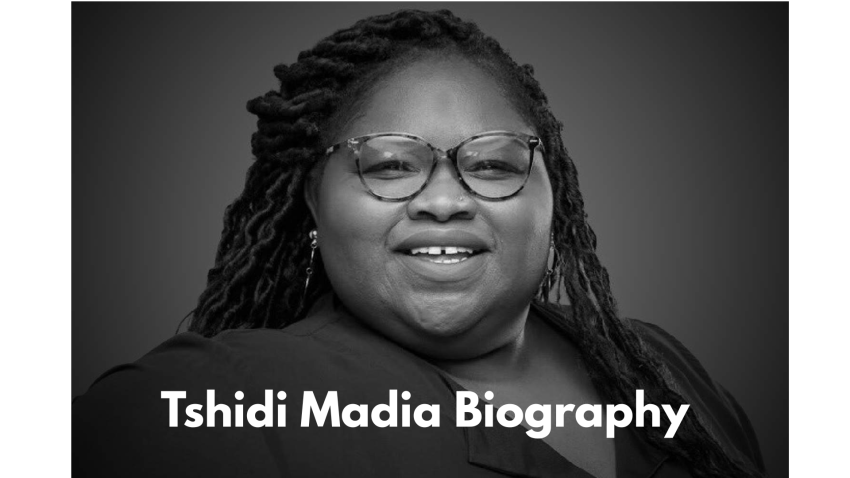Tshidi Madia was one of South Africa’s most respected broadcast journalists — a forceful, clear-eyed politics editor and mentor whose reporting shaped the way many South Africans understood the daily business of politics.
Her sudden passing in August 2025 sent shockwaves across the media, political and civic communities. This biography traces her early life, professional path, notable work, and the legacy she leaves behind.
Early life and background
Matshidiso “Tshidi” Madia was born and raised in the City of Ekurhuleni (Leondale/Germiston area), where the social and political transitions of the post-apartheid era helped shape the lens through which she would later cover power and governance. Several biographical profiles place her birth in late August 1983 (commonly cited as 23 August 1983), and she remained deeply connected to her hometown throughout her life.
Education and formation as a journalist
Tshidi pursued formal media training and academic study focused on communications and journalism. Reports and organizational profiles note that she completed tertiary studies in communications — honing the reporting, research and editorial skills that would later make her a trusted political voice.
Career: from reporter to editorial leader
Tshidi Madia’s career progressed steadily from reporter through to editorial leadership. She is best known as associate editor for politics at Eyewitness News (EWN), where she anchored political coverage, moderated interviews with leading figures, and led editorial coverage that combined rigour with clear public service purpose. Her colleagues describe her as fearless, incisive and unflinchingly fair — qualities that made her questions and coverage essential listening for anyone following South African politics.
Reporting style and notable stories
Tshidi’s reporting was known for combining deep subject knowledge with an approach that was accessible to a broad audience. She could press politicians with tough, well-researched questions while also explaining the implications of policy choices in simple terms. This balance won her admiration from peers and from listeners who relied on EWN for trustworthy political updates.
Mentor, colleague and public figure
Beyond reporting, Tshidi was widely recognized as a mentor to younger journalists. Colleagues consistently described her as generous with time and knowledge, patient in coaching new reporters and uncompromising about journalistic ethics. Her presence in newsrooms and at journalism events helped build networks of reporters committed to rigorous political coverage.
Recognition and public response
Tshidi Madia’s influence extended beyond newsroom applause. Professional organizations, government figures and civil society groups publicly mourned her passing and praised the contribution of her journalism to democratic debate. High-profile tributes emphasized the gap her death left in political reporting and the condolences from leaders reflected the national scale of the loss.
Death and the outpouring of grief
Tshidi Madia passed away on 27 August 2025 after a short illness; she was 42 years old. Her death prompted immediate tributes from colleagues, public officials and media freedom organizations, and numerous memorials and statements noted both her professional integrity and personal warmth. The City of Ekurhuleni and many media institutions paid public tribute to her life and work.
Legacy: what Tshidi Madia leaves behind
- Editorial standards: She raised the bar for political journalism at EWN and beyond.
- Mentorship: Hundreds of young reporters cite her as a formative influence.
- Public trust: Her style of patient, probing, and public-focused reporting contributed to deeper civic understanding of governance.
Her death is a reminder of the critical role journalists play in democratic life — and of the need to continue training and supporting the next generation of reporters who will hold leaders to account.
FAQs
Who was Tshidi Madia?
Matshidiso “Tshidi” Madia was a South African broadcast journalist best known as associate editor for politics at Eyewitness News (EWN).
When was she born?
Multiple profiles list her birth as 23 August 1983.
When did Tshidi Madia die?
She passed away on 27 August 2025 after a short illness, aged 42.
What was her role at EWN?
She served as associate editor for politics and was a leading voice in EWN’s political coverage.
Where was she from?
She was born and raised in the City of Ekurhuleni (Leondale/Germiston area).
What made her reporting stand out?
Her balance of tough, well-researched questioning with a commitment to explaining policy to everyday listeners made her work both authoritative and accessible.
How is she remembered?
She is remembered as a fearless and principled journalist, a generous mentor, and a journalist who elevated political coverage in South Africa.
Conclusion
Tshidi Madia’s life was a testament to what principled, well-crafted journalism can achieve in a democracy. From her roots in Ekurhuleni to her role shaping political coverage at EWN, she combined rigour, empathy and mentorship in ways that strengthened the media ecosystem. While her passing in August 2025 leaves a profound gap, the standards she set and the journalists she inspired ensure that her influence will continue.
